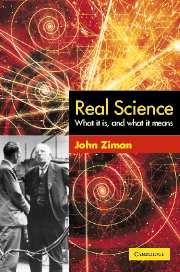Book contents
- Frontmatter
- Contents
- Preface
- 1 A peculiar institution
- 2 Basically, it's purely academic
- 3 Academic science
- 4 New modes of knowledge production
- 5 Community and communication
- 6 Universalism and unification
- 7 Disinterestedness and objectivity
- 8 Originality and novelty
- 9 Scepticism and the growth of knowledge
- 10 What, then, can we believe?
- Endnotes
- Bibliography and author index
- Index
Preface
Published online by Cambridge University Press: 24 August 2009
- Frontmatter
- Contents
- Preface
- 1 A peculiar institution
- 2 Basically, it's purely academic
- 3 Academic science
- 4 New modes of knowledge production
- 5 Community and communication
- 6 Universalism and unification
- 7 Disinterestedness and objectivity
- 8 Originality and novelty
- 9 Scepticism and the growth of knowledge
- 10 What, then, can we believe?
- Endnotes
- Bibliography and author index
- Index
Summary
The seeds of this book were sown forty years ago. I was always infatuated with science and beguiled by philosophy. They seemed made for each other – and for me. But the better I came to know science, the more I realized that the philosophers were not telling it like it is. Then, sometime around 1959, I was asked to review Michael Polanyi's Personal Knowledge and Karl Popper's The Logic of Scientific Discovery. Each of these great books says important things about science; but in both I noticed a whole pack of dogs that didn't bark. What about the web of lectures, examinations, seminars, conferences, papers, citations, referee reports, books, personal references, job interviews, appointments, prizes, etc. in which my scientific life was entangled? Surely these must have some influence on the work I was doing. So in radio talks and articles I began to say strange things, such as ‘Science is social’ and ‘Research is a profession’.
Those were rash words for a young and aspiring physicist without official credentials in philosophy or sociology. Nevertheless, the heterodoxy was overlooked and my academic career prospered. The books in which I developed this theme – Public Knowledge, Reliable Knowledge and An Introduction to Science Studies – were also very well received, and are still read and cited. Indeed, many of the notions that germinated in these books have since been planted out more formally by other scholars. And just as I foresaw, sociology has superseded philosophy at the theoretical core of ‘science studies’.
- Type
- Chapter
- Information
- Real ScienceWhat it Is and What it Means, pp. ix - xiiPublisher: Cambridge University PressPrint publication year: 2000

